2021-2022学年冀教版英语九年级上册Unit 4 Lesson 19 A Story or a Poem?课件(共29张PPT)
文档属性
| 名称 | 2021-2022学年冀教版英语九年级上册Unit 4 Lesson 19 A Story or a Poem?课件(共29张PPT) | 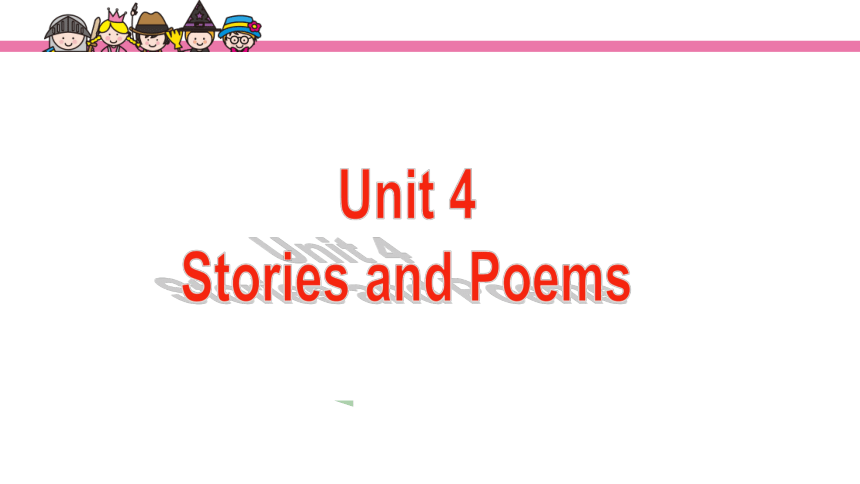 | |
| 格式 | pptx | ||
| 文件大小 | 2.0MB | ||
| 资源类型 | 教案 | ||
| 版本资源 | 冀教版 | ||
| 科目 | 英语 | ||
| 更新时间 | 2021-10-17 15:36:57 | ||
图片预览

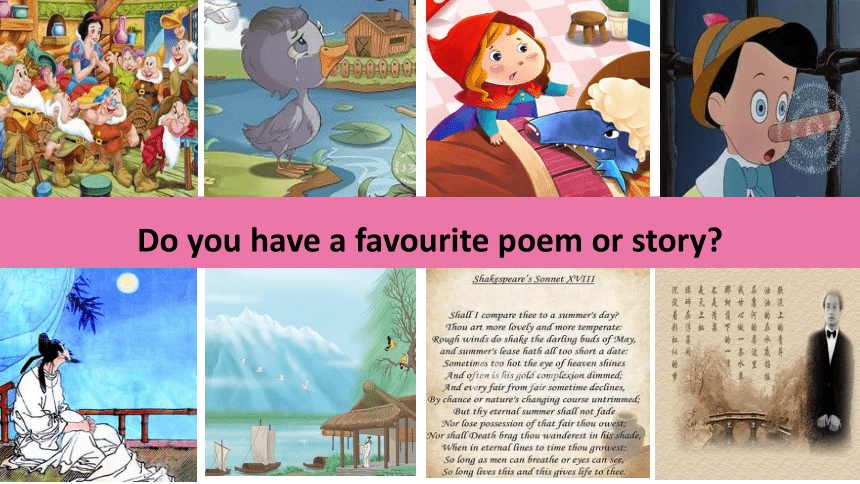
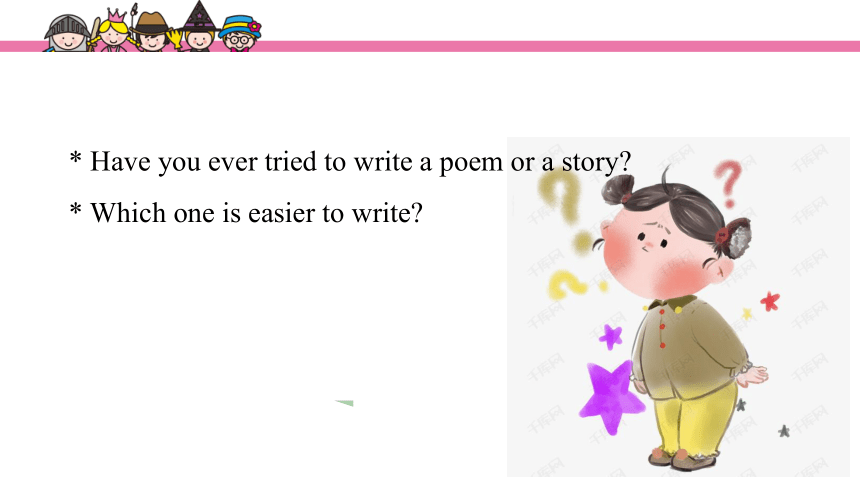
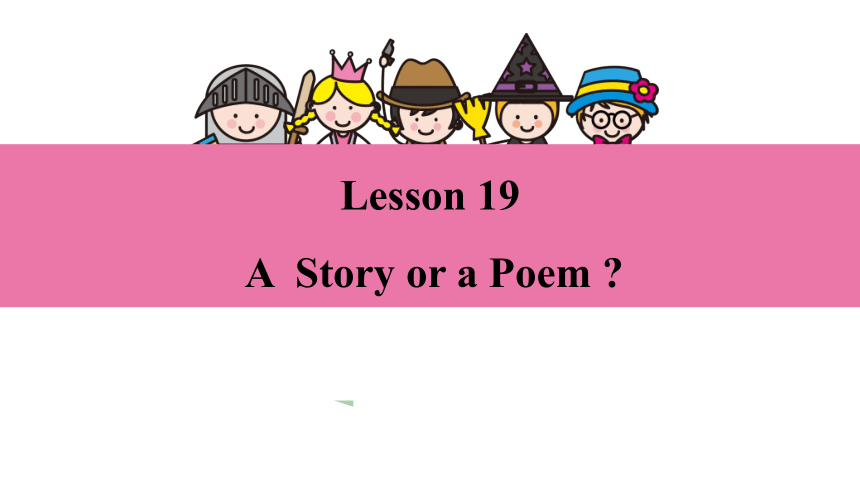

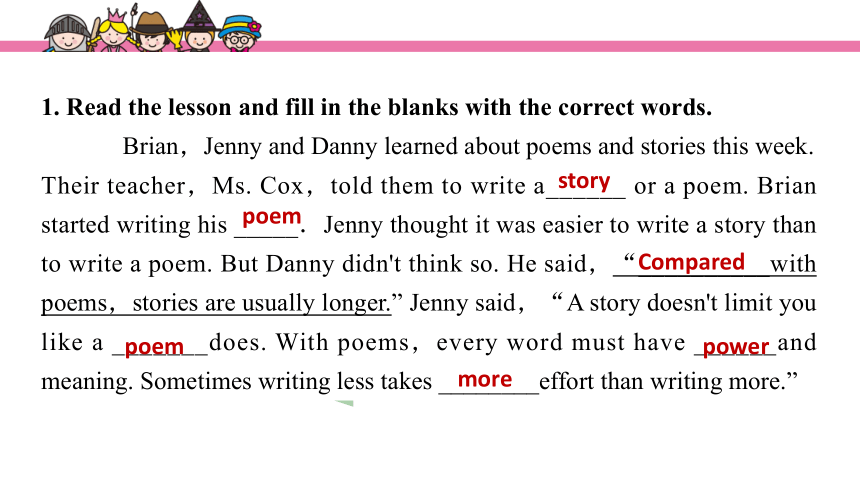
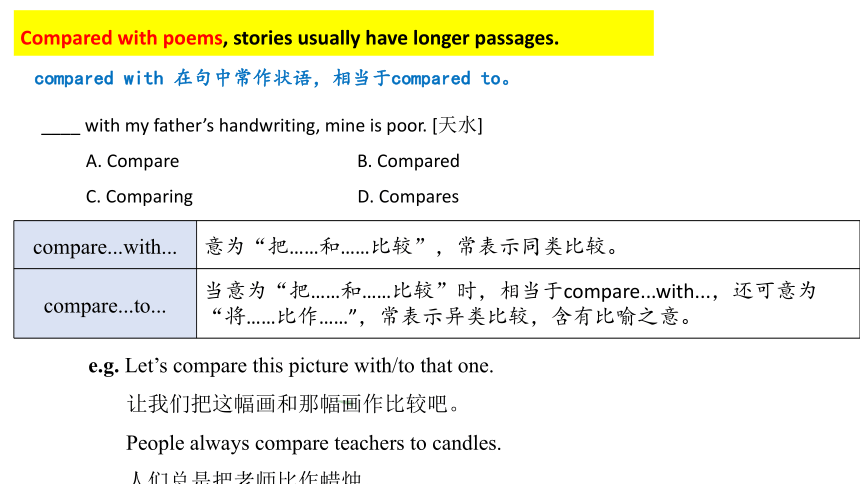
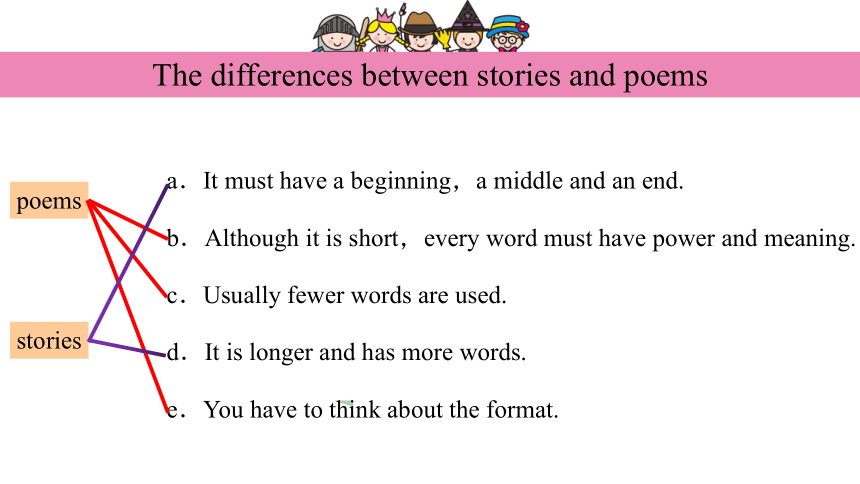
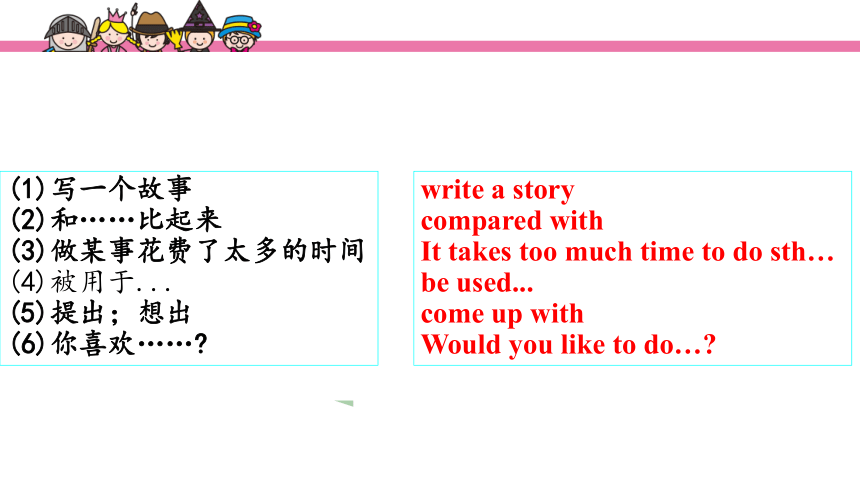
文档简介
(共29张PPT)
Unit 4
Stories and Poems
Lead in
Do you have a favourite poem or story
* Have you ever tried to write a poem or a story
* Which one is easier to write
Lesson 19
A Story or a Poem
compare
passage
limit
format
rhyme
although
effort
fat
aloud
v. 比较
n. 章节;段落
v. 限制;限定
n. 格式;版式
n. 韵;韵脚/ v. 押韵
conj. 虽然,尽管;
不过,然而
n. 精力;努力
adj. 胖的;厚的
n. 脂肪;肥肉
adv. 出声地;大声地
1. Read the lesson and fill in the blanks with the correct words.
Brian,Jenny and Danny learned about poems and stories this week. Their teacher,Ms. Cox,told them to write a______ or a poem. Brian started writing his _____.Jenny thought it was easier to write a story than to write a poem. But Danny didn't think so. He said,“__________with poems,stories are usually longer.” Jenny said,“A story doesn't limit you like a _______does. With poems,every word must have ______and meaning. Sometimes writing less takes ________effort than writing more.”
story
poem
Compared
poem
power
more
compare...with... 意为“把……和……比较”,常表示同类比较。
compare...to... 当意为“把……和……比较”时,相当于compare...with...,还可意为“将……比作……”,常表示异类比较,含有比喻之意。
e.g. Let’s compare this picture with/to that one.
让我们把这幅画和那幅画作比较吧。
People always compare teachers to candles.
人们总是把老师比作蜡烛。
Compared with poems, stories usually have longer passages.
compared with 在句中常作状语,相当于compared to。
____ with my father’s handwriting, mine is poor. [天水]
A. Compare B. Compared
C. Comparing D. Compares
The differences between stories and poems
poems
stories
a.It must have a beginning,a middle and an end.
b.Although it is short,every word must have power and meaning.
c.Usually fewer words are used.
d.It is longer and has more words.
e.You have to think about the format.
write a story
compared with
It takes too much time to do sth…
be used...
come up with
Would you like to do…
(1)写一个故事
(2)和……比起来
(3)做某事花费了太多的时间
(4)被用于...
(5)提出;想出
(6)你喜欢……
花精力
Have you finished your English homework yet, Brian
yet adv. 还;已经, 还可作连词,意为“但是;然而”,表转折,与but 相比
yet 一般用在现在完成时的否定句和疑问句句末,疑问句中表示“已经”,否定句中表示“还”。
already “已经”,通常放在现在完成时的肯定句中,若放在疑问句中,则表示吃惊、意外的口气。
Have you found your pen yet
你已经找到你的钢笔了吗?
You have already told me that.
你已经告诉过我那件事了。
—Is dinner ready
—Not ________.
A. already B. just
C. yet D. ever
辨析:too much, too many 与much too
too much 意为“太多”,用来修饰不可数名词;
too many 意为“太多” , 用来修饰可数名词的复数形式。
much too 意为“太”,用来修饰形容词或副词,中心词是too。
too much, much too用法区别看后头,
much 后接不可数名词,too 后应接形或副。
too many 要牢记,其后名词必复数。
Spending too much ______ playing computer games is bad for your ______.
A. time; eye B. time; eyes C. times; eyes
effort /‘ef t/ n. 努力;精力,表示一般性的努力 (即表泛指意义),通常是不可数名词。
effort 的常用短语:
① make an effort to do sth. 努力做某事
② make every effort 尽一切努力
③ spare no effort to do sth. 尽力/ 不遗余力做某事
④ put effort into sth. 为某事付出努力
⑤ without effort 毫不费力
大声副词三兄弟,loud串门形容词,
aloud 出声,loud 嗓门大,loudly讨厌不悦耳。
Reading ______ is my best way to learn English.
A. loudest B. louder
C. more loudly D. aloud
D
Although a poem has fewer words, it’s not always easier to write.
although / l' / conj. 虽然,尽管;不过,然而
e.g. Although/Though he is very tired, he is still working.
= He is very tired, but he is still working.
虽然他很累,但是他仍然在工作。
Even though he can afford a new car, he won’t buy one.
即使他能买得起一辆新的小汽车,他也不会买一辆。
even though = even if 即使……;纵然……
although 为连词时,与though 同义,一般情况下可以互换,不能与but, however 连用,但可与yet, still连用,而且可以转换成用but连接的句子。
拓展:though 作副词时,意为“然而,可是”,放在句尾。不能与although互换。
e.g. Our team lost. It was a good game, though.
我们队输了。可是这是一场好的比赛。
温馨提示:
even 能和though 搭配,但是even 不能与although 搭配。
Every story must have a beginning, a middle and an end.
You must use words very carefully because so few words are used in poems.
Every word must have power and meaning.
must +V(原)
must 为情态动词, 表示“必须”
must是情态动词,没有人称或数的变化,后接动词原形,其主要用法如下:
表示义务或必要性,意思是“应该、必
须”,通常用于肯定句及疑问句。
You must go to bed now.
你现在必须睡觉了。
Must I start at once
我必须立刻出发吗?
2. must的否定式是must not/ mustn’t,意思是“不应该、禁止”,语气较强烈。
You must not smoke here.
你不许在这里吸烟。
We mustn’t be late again.
我们不应该再迟到了。
3. 由must引出的一般疑问句,肯定回答用must,否定回答用needn’t, don’t need to或don’t have to均可,但不用mustn’t,因为mustn’t表示“不许、禁止”的意思,与问句的原意不符。
—Must I stay at home
我必须留在家里吗?
—Yes, you must.
是的,你必须留在家里。
— No, you needn’t. /No, you don’t have to.
不,不用了。
如果是反意疑问句,疑问部分一般不用needn’t, 而用mustn’t;否定回答时仍用needn’t, don’t need to或don’t have to.
—You must go on foot, mustn’t you
你必须走着去,是吗?
—Yes, I must.
是的,是这样。
— No, I needn’t. /No, I don’t have to.
不,不是的。
4. 当说话人对所发生的事情进行推测时,must的意思是“一定、准是”,主要用于肯定句,否定句常用can’t。
He must be a doctor.
他一定是个大夫。
She is not at home. She must be out.
她不在家里,她一定外出了。
注意:must表示推测,用于反意疑问句时,疑问部分不能用must, 应与其后面的动词保持一致。
She must be home, isn’t she
她一定在家里,是吗?
Tom must have a sister, hasn’t he / doesn’t he
汤姆肯定有一个妹妹,是吗?
2) have to可以放在will后面构成将来时,而must则不能。
误:He will must go there tomorrow.
正:He will have to go there tomorrow.
正:He must go there tomorrow.
他明天必须去那里。
Now read the poem- the Donut on Page 50 and try to find the rhyme.
The Donut
When I wake up on a warm sunny morning in ,
A hot, fresh and fat donut is my favourite .
The smell of it gets me up on my ,
Like it’s calling me aloud to !
With this sweet circle in my ,
I like to think about going .
There, with my parents, I can go for a short ,
To sit in the sunshine eating donuts all !
spring
thing
feet
eat
mouth
south
stay
day
Try to change Danny’s poem with words you like. Share your new poem with your classmates.
When I wake up on a warm sunny morning in spring,
A_______ (adjective), ______ (adjective) and______ (adjective) ______(food) is my favorite thing.
The smell of it gets me up on my feet,
Like it’s calling me aloud to eat!
With this_____ (adjective) _____ (noun) in my mouth,
I like to think about going south.
There, with my ___ (person), I can go for a short stay,
To sit in the sunshine eating _____ (food) all day!
1. —Where is Mary
— She ____ in the library.
A. should be B. must be
C. can be D. must have been
2. His room is dark. He must ____ to bed.
A. go B. be going
C. have gone D. have been gone
3. —“I think Helen is at home.”
—“ No, she ____ be at home, for she
phoned me from the airport just five
minutes ago.”
A. mustn’t B. needn’t
C. can’t D. daren’t
4. He’s late. What ____ have happened to
him
A. can B. may
C. should D. must
5. “Must he do it ” “No, he ____.”
A. mustn’t B. needn’t
C. doesn’t have to D. B or C
6. You must be a writer, ____ you
A. mustn’t B. are
C. must D. aren’t
7. We ____ hurry if we want to arrive in
time.
A. must B. need
C. may D. have to
Unit 4
Stories and Poems
Lead in
Do you have a favourite poem or story
* Have you ever tried to write a poem or a story
* Which one is easier to write
Lesson 19
A Story or a Poem
compare
passage
limit
format
rhyme
although
effort
fat
aloud
v. 比较
n. 章节;段落
v. 限制;限定
n. 格式;版式
n. 韵;韵脚/ v. 押韵
conj. 虽然,尽管;
不过,然而
n. 精力;努力
adj. 胖的;厚的
n. 脂肪;肥肉
adv. 出声地;大声地
1. Read the lesson and fill in the blanks with the correct words.
Brian,Jenny and Danny learned about poems and stories this week. Their teacher,Ms. Cox,told them to write a______ or a poem. Brian started writing his _____.Jenny thought it was easier to write a story than to write a poem. But Danny didn't think so. He said,“__________with poems,stories are usually longer.” Jenny said,“A story doesn't limit you like a _______does. With poems,every word must have ______and meaning. Sometimes writing less takes ________effort than writing more.”
story
poem
Compared
poem
power
more
compare...with... 意为“把……和……比较”,常表示同类比较。
compare...to... 当意为“把……和……比较”时,相当于compare...with...,还可意为“将……比作……”,常表示异类比较,含有比喻之意。
e.g. Let’s compare this picture with/to that one.
让我们把这幅画和那幅画作比较吧。
People always compare teachers to candles.
人们总是把老师比作蜡烛。
Compared with poems, stories usually have longer passages.
compared with 在句中常作状语,相当于compared to。
____ with my father’s handwriting, mine is poor. [天水]
A. Compare B. Compared
C. Comparing D. Compares
The differences between stories and poems
poems
stories
a.It must have a beginning,a middle and an end.
b.Although it is short,every word must have power and meaning.
c.Usually fewer words are used.
d.It is longer and has more words.
e.You have to think about the format.
write a story
compared with
It takes too much time to do sth…
be used...
come up with
Would you like to do…
(1)写一个故事
(2)和……比起来
(3)做某事花费了太多的时间
(4)被用于...
(5)提出;想出
(6)你喜欢……
花精力
Have you finished your English homework yet, Brian
yet adv. 还;已经, 还可作连词,意为“但是;然而”,表转折,与but 相比
yet 一般用在现在完成时的否定句和疑问句句末,疑问句中表示“已经”,否定句中表示“还”。
already “已经”,通常放在现在完成时的肯定句中,若放在疑问句中,则表示吃惊、意外的口气。
Have you found your pen yet
你已经找到你的钢笔了吗?
You have already told me that.
你已经告诉过我那件事了。
—Is dinner ready
—Not ________.
A. already B. just
C. yet D. ever
辨析:too much, too many 与much too
too much 意为“太多”,用来修饰不可数名词;
too many 意为“太多” , 用来修饰可数名词的复数形式。
much too 意为“太”,用来修饰形容词或副词,中心词是too。
too much, much too用法区别看后头,
much 后接不可数名词,too 后应接形或副。
too many 要牢记,其后名词必复数。
Spending too much ______ playing computer games is bad for your ______.
A. time; eye B. time; eyes C. times; eyes
effort /‘ef t/ n. 努力;精力,表示一般性的努力 (即表泛指意义),通常是不可数名词。
effort 的常用短语:
① make an effort to do sth. 努力做某事
② make every effort 尽一切努力
③ spare no effort to do sth. 尽力/ 不遗余力做某事
④ put effort into sth. 为某事付出努力
⑤ without effort 毫不费力
大声副词三兄弟,loud串门形容词,
aloud 出声,loud 嗓门大,loudly讨厌不悦耳。
Reading ______ is my best way to learn English.
A. loudest B. louder
C. more loudly D. aloud
D
Although a poem has fewer words, it’s not always easier to write.
although / l' / conj. 虽然,尽管;不过,然而
e.g. Although/Though he is very tired, he is still working.
= He is very tired, but he is still working.
虽然他很累,但是他仍然在工作。
Even though he can afford a new car, he won’t buy one.
即使他能买得起一辆新的小汽车,他也不会买一辆。
even though = even if 即使……;纵然……
although 为连词时,与though 同义,一般情况下可以互换,不能与but, however 连用,但可与yet, still连用,而且可以转换成用but连接的句子。
拓展:though 作副词时,意为“然而,可是”,放在句尾。不能与although互换。
e.g. Our team lost. It was a good game, though.
我们队输了。可是这是一场好的比赛。
温馨提示:
even 能和though 搭配,但是even 不能与although 搭配。
Every story must have a beginning, a middle and an end.
You must use words very carefully because so few words are used in poems.
Every word must have power and meaning.
must +V(原)
must 为情态动词, 表示“必须”
must是情态动词,没有人称或数的变化,后接动词原形,其主要用法如下:
表示义务或必要性,意思是“应该、必
须”,通常用于肯定句及疑问句。
You must go to bed now.
你现在必须睡觉了。
Must I start at once
我必须立刻出发吗?
2. must的否定式是must not/ mustn’t,意思是“不应该、禁止”,语气较强烈。
You must not smoke here.
你不许在这里吸烟。
We mustn’t be late again.
我们不应该再迟到了。
3. 由must引出的一般疑问句,肯定回答用must,否定回答用needn’t, don’t need to或don’t have to均可,但不用mustn’t,因为mustn’t表示“不许、禁止”的意思,与问句的原意不符。
—Must I stay at home
我必须留在家里吗?
—Yes, you must.
是的,你必须留在家里。
— No, you needn’t. /No, you don’t have to.
不,不用了。
如果是反意疑问句,疑问部分一般不用needn’t, 而用mustn’t;否定回答时仍用needn’t, don’t need to或don’t have to.
—You must go on foot, mustn’t you
你必须走着去,是吗?
—Yes, I must.
是的,是这样。
— No, I needn’t. /No, I don’t have to.
不,不是的。
4. 当说话人对所发生的事情进行推测时,must的意思是“一定、准是”,主要用于肯定句,否定句常用can’t。
He must be a doctor.
他一定是个大夫。
She is not at home. She must be out.
她不在家里,她一定外出了。
注意:must表示推测,用于反意疑问句时,疑问部分不能用must, 应与其后面的动词保持一致。
She must be home, isn’t she
她一定在家里,是吗?
Tom must have a sister, hasn’t he / doesn’t he
汤姆肯定有一个妹妹,是吗?
2) have to可以放在will后面构成将来时,而must则不能。
误:He will must go there tomorrow.
正:He will have to go there tomorrow.
正:He must go there tomorrow.
他明天必须去那里。
Now read the poem- the Donut on Page 50 and try to find the rhyme.
The Donut
When I wake up on a warm sunny morning in ,
A hot, fresh and fat donut is my favourite .
The smell of it gets me up on my ,
Like it’s calling me aloud to !
With this sweet circle in my ,
I like to think about going .
There, with my parents, I can go for a short ,
To sit in the sunshine eating donuts all !
spring
thing
feet
eat
mouth
south
stay
day
Try to change Danny’s poem with words you like. Share your new poem with your classmates.
When I wake up on a warm sunny morning in spring,
A_______ (adjective), ______ (adjective) and______ (adjective) ______(food) is my favorite thing.
The smell of it gets me up on my feet,
Like it’s calling me aloud to eat!
With this_____ (adjective) _____ (noun) in my mouth,
I like to think about going south.
There, with my ___ (person), I can go for a short stay,
To sit in the sunshine eating _____ (food) all day!
1. —Where is Mary
— She ____ in the library.
A. should be B. must be
C. can be D. must have been
2. His room is dark. He must ____ to bed.
A. go B. be going
C. have gone D. have been gone
3. —“I think Helen is at home.”
—“ No, she ____ be at home, for she
phoned me from the airport just five
minutes ago.”
A. mustn’t B. needn’t
C. can’t D. daren’t
4. He’s late. What ____ have happened to
him
A. can B. may
C. should D. must
5. “Must he do it ” “No, he ____.”
A. mustn’t B. needn’t
C. doesn’t have to D. B or C
6. You must be a writer, ____ you
A. mustn’t B. are
C. must D. aren’t
7. We ____ hurry if we want to arrive in
time.
A. must B. need
C. may D. have to
同课章节目录
- Unit 1 Stay Healthy
- Lesson 1 What's Wrong,Danny?
- Lesson 2 A Visit to the Dentist
- Lesson 3 Good Food, Good Health
- Lesson 4 Don't Smoke, Please!
- Lesson 5 Jane's Lucky Life
- Lesson 6 Stay Away from the Hospital
- Unit Review
- Unit 2 Great People
- Lesson 7 What Is the Meaning of Lift?
- Lesson 8 A Universe of Thought
- Lesson 9 China's Most Famous "Farmer"
- Lesson 10 Touch the World
- Lesson 11 To China, with Love
- Lesson 12 Guess My Hero!
- Unit Review
- Unit 3 Safety
- Lesson 13 Be Careful,Danny!
- Lesson 14 Accidents Happen
- Lesson 15 My Helmet Saved My Life!
- Lesson 16 How Safe Is Your Home?
- Lesson 17 Staying Safe in an Earthquake
- Lesson 18 Never Catch a Dinosaur
- Unit Review
- Unit 4 Stories and poems
- Lesson 19 A Story or a Poem?
- Lesson 20 Say It in Five
- Lesson 21 The Fable of the Woodcutte
- Lesson 22 The Giant(Ⅰ)
- Lesson 23 The Giant(Ⅱ)
- Lesson 24 Writing a Poem
- Unit Review
- Unit 5 Look into Science
- Lesson 25 Let's Do an Experiment!
- Lesson 26 Keep the Candle Burning
- Lesson 27 Planet Danny
- Lesson 28 The Study of Living Things
- Lesson 29 DNA—The Story of You
- Lesson 30 Science Affects Us
- Unit Review
- Unit 6 Movies and Theate
- Lesson 31 A movie or a Play
- Lesson 32 Moving Pictures
- Lesson 33 The Fisherman and the Goldfish(Ⅰ)
- Lesson 34 The Fisherman and the Goldfish(Ⅱ)
- Lesson 35 Theatres Are Fun!
- Lesson 36 Making Plays Is Fun
- Unit Review
